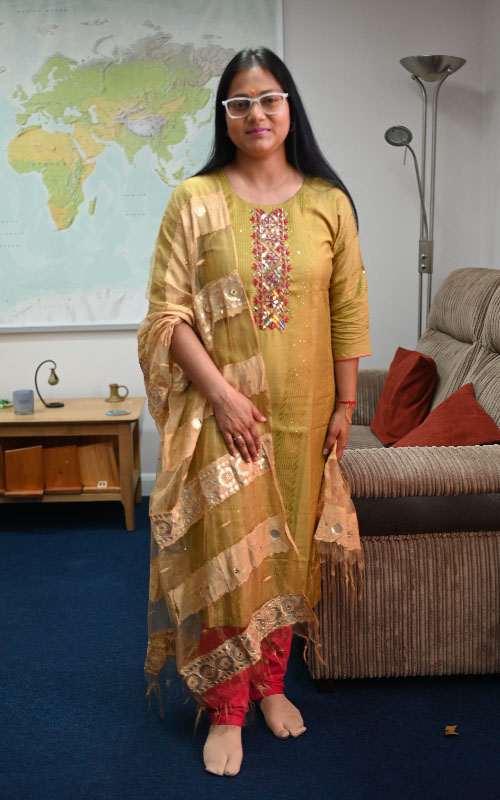Vanjyotsna talks to us about Diwali and other meaningful Hindu celebrations

In this interview, International MBA student, Vanjyotsna, talks to us about meaningful celebrations in her culture, and her involvement in the University's Diwali celebration, taking place on 14 November.
Hello Vanjyotsna, thank you for taking the time to talk with us. Please can you start by introducing yourself?
Hello, I am Vanjyotsna Grover. I am from Delhi a Capital of India. I am an International student studying International MBA at the University of Wolverhampton, Level 7 and my course will end in May 2024.
How and why did you come together to celebrate these festivals at University?
It is always good to get connected with your community people, Internationally. I got connected with my Indian community people in my IMBA course and got to know about the Chaplaincy, and through their valuable support, we have celebrated the Dusshera festival over there. We have got all support from the Chaplaincy like complete access to the kitchen, venue, etc. I would like to thank all for their kind support and for making our event memorable.
Furthermore, we are celebrating another main Indian festival called Diwali, on 14 November, in the Lord Swraj Paul courtyard (behind the Business School off Stafford Street), from 4pm to 7.30pm and you will enjoy pooja, snacks, dance, and music!
Soon we will have an Indian Society, via the Student Union, so that we will get good support from the union to organise more and more Indian festivals on a large scale and make the Indian events more successful and memorable.
Can you tell us about some of the Hindu festivals you celebrate?
Indian culture is very vibrant and colourful. It is home to a total of 121 languages and 270 mother tongues. Different communities throughout the country celebrate and share their different language, rituals, prayers, food, clothes, dance forms, etc. Moreover, the main festivals of India are Holi, Diwali, Navratri & Dusshera, Eid, Onam, Sankranthi, Ganpati Sthapna, Durga Puja, Janmashtami etc.
With Diwali, which is one of the most important festivals of India, every region in India has distinctive traditions for commemorating this festival, but whatever the customs, there is agreement that Diwali represents the triumph of good over evil, light over darkness and wisdom over ignorance.
On Diwali night, most people offer prayers to Lakshmi, the goddess of wealth, and Ganesh, the god representing good fortune and wisdom for the coming year.
The weeks leading up to Diwali are traditionally a time for redecorating the home, buying new clothes and jewellery, and exchanging gifts such as sweetmeats, dried fruits and nuts. This is the season for dinner parties, outdoor food festivals and craft fairs, all of which help build up excitement ahead of the main Diwali celebration.
Expect drinks and plenty of finger food at these parties, which will usually include platters of kebabs, fried savoury snacks, tandoori grills and spiced sweetmeats (mithai).
Savoury snacks could include samosas, bhajis, aloo tikki (griddle-cooked potato patties) and channa bhatura (spiced chickpeas and puffed bread). Gujarat in west India is famed for its crunchy snacks, known as ‘farssan’.
We know that Diwali is also a significant time of celebration for people of the Sikh faith. Can you tell us a bit about meaning across different cultures?
For Hindus, this is linked to the ancient legend of Lord Rama, who was deprived of his kingdom and sent into exile for 14 years. Diwali celebrates Rama’s eventual defeat of the evil spirit Ravana, and his triumphant return to his home. For Jains, it is a time to celebrate Lord Mahavira, the founder of Jainism, and the moment reached a state of enlightenment. For Sikhs, the celebration highlights the release of guru Hargobind Singh from prison and his return to Amritsar.
That’s how celebrations of Diwali occur with the common message between Hindi and Sikh that is to Win over Evil.
If you weren’t at University, how would you be celebrating with your family and friends?
I personally celebrate the Diwali festival with my family and friends. I decorate my home with raingoli, diyas (light lamps), candles lighting the home, and other such decorations and accessories; and I wear traditional colourful clothes like Lehenga Choli, Saree, Suits etc.
We prepare special Indian food and sweets at home like Gulab Jamun, Chole Bhature, Dal Makhni and Rice, Kheer, etc. and invite friends and family to our homes for dinner and fireworks.
Thank you once again, this has been very enlightening. Before we go, can you tell us why chose to study at the University of Wolverhampton and what your future plans are?
I chose to study at the University of Wolverhampton because of its strong academic programs and excellent reputation in my field of interest. I am enjoying my time here, particularly the diverse student community and the supportive faculty. The University provides a range of resources and opportunities for personal and academic growth, and I appreciate the emphasis on practical experience alongside theoretical learning.
As for my future plans, I’m still exploring my options, but I am considering various career paths related to my field of study. I hope to continue my education and make the most of the opportunities available at the University of Wolverhampton to prepare myself for a successful and fulfilling career.
For more information please contact the Corporate Communications Team.


/prod01/wlvacuk/media/departments/digital-content-and-communications/images-2024/240328-Varsity-Line-Up-Resized.jpg)
/prod01/wlvacuk/media/departments/digital-content-and-communications/images-18-19/220325-Engineers_teach_thumbail.jpg)
/prod01/wlvacuk/media/departments/digital-content-and-communications/images-2024/240515-Spencer-Jones-Award-Resized.jpg)
/prod01/wlvacuk/media/departments/digital-content-and-communications/images-2024/240320-Uzbekistan-Resized.jpg)
/prod01/wlvacuk/media/departments/digital-content-and-communications/images-2024/240229-The-Link-Resized.jpg)
/prod01/wlvacuk/media/departments/digital-content-and-communications/images-2024/240516-Andy-Gibson-Resized.jpg)